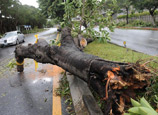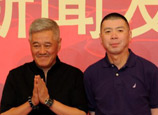
HARBIN, July 13 (Xinhua) -- The role of genetic modification (GM) technology in Asian agriculture remains unclear and individual countries have adopted different approaches to tackle the sensitive subject.
At a food security meeting held by ASEAN Plus Three (APT) countries this week, participants from ASEAN countries, China, Japan and the Republic of Korea (ROK) showed ambivalence toward GM technology.
The 13 countries, with a combined population of over 2 billion people, rely heavily on agricultural production and have a significant part of their population devoted to growing crops.
Meanwhile, 560 million people in Asia are suffering from hunger.
Leonardo Montemayor, president of the Federation of Free Farmers of the Philippines, said an increasing number of people in his country have started planting GM corn after realizing that the corn is more resistant to pests and diseases.
However, Dao The Anh, director of Vietnam's Center for Agrarian Systems Research and Development, has voiced concern about the social and economic consequences GM crops could bring, including their potential impact on biodiversity.
As supplies of genetically engineered seeds are monopolized by a few corporations, some farmers worry about maintaining sustainable access to GM technology, as well as possible future price hikes that could render the seeds unaffordable for poor farmers.
Pornsil Patchrintanakul, vice chairman of the Thai Chamber of Commerce, said there is no consensus among the ASEAN community regarding GM crops, adding that the countries are divided on the adoption and popularization of GM technology.
Growing GM crops is forbidden in Thailand, Patchrintanakul added.
This is also the case in China. The world's biggest grain producer maintains a standing policy that forbids growing GM grain.
But China does allow imports of certain GM products. In 2012, China imported over 58 million tons of soybeans - mostly genetically modified -- a practice that has been going on for years.
Public opinions on GM crops in China are polarized, with a great number of people holding suspicions toward GM products.
Rao Yi, a renowned professor and dean of Peking University's School of Life Sciences, said that while some GM-related concerns still need to be discussed, there are also rumors that need to be dispelled.
"There have not been detrimental effects to human health from GM organisms. Because these organisms are so diverse, everything has to be judged on a case-by-case basis," said Brett Rierson, United Nations World Food Programme (WFP) representative to China.
According to a paper issued by the World Health Organization, "GM foods currently available on the international market have passed risk assessments and are not likely to present risks for human health. In addition, no effects on human health have been shown as a result of the consumption of such foods by the general population in the countries where they have been approved."
There are also economic issues at play. Domestically-grown soybeans are scarce in China, as China's imports of GM soybeans rocketed to 58 million tons from less than 3 million tons in 1997. Many farmers have abandoned soybeans for other crops, as imported soybeans are cheaper in price.
"GM is difficult to discuss in the Chinese media (and with the Chinese public). The discourse has been greatly distorted by extremists. The media has been influenced by them," Rao said.
GM technology is the future of agriculture, said Fang Zhouzi, a biochemist and vocal supporter of GM technology, adding that it will be harder for China to catch up with the U.S., which already has advanced GM technology, if China does not recognize this fact.
But safety concerns apparently have not been ruled out by APT countries, which include some of the world's biggest producers, importers and exporters of agricultural products. Diverse cultures and religions span across these countries and reservations about GM are sometimes based on religious or cultural beliefs.
Getachew Diriba, country director at WFP, said the organization has no opinion regarding GM. "But it's out there, it's being used. It is up to individual countries to exactly determine when to use and when not to use it," he said.
















 Typhoon Soulik kills one in Taiwan, brings rainstorms to Fujian
Typhoon Soulik kills one in Taiwan, brings rainstorms to Fujian


![]()
